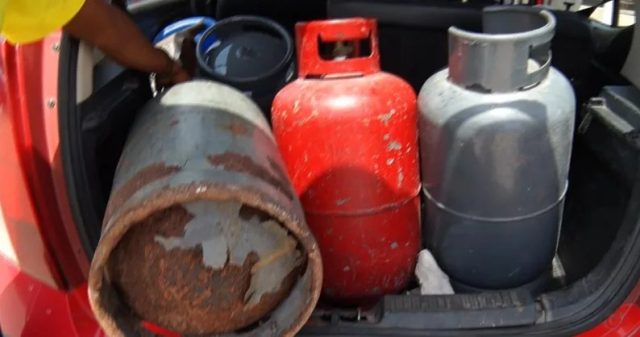By Kingsley Webora Tankeh
Did you know that a Liquefied Petroleum Gas cylinder has a lifespan of 15 years after which it ought to be returned to the refilling point to be exchanged for a new one? Did you also know that after an efficient use, a gas cylinder would have undergone some wear and tear, affecting its structural integrity, and making it dangerous to continue using it?
In Accra, some unscrupulous persons refurbish expired gas cylinders for sale to unsuspecting customers which is very dangerous and poses a grave risk to public safety with far-reaching consequences. These crooks refurbish expired cylinders by rigorous scuff sanding, redesigning and spraying them to look bright and appear as though they were new.
With this deceptive new look, these expired cylinders find themselves back onto the market and people buy them.
GBCNEWS set out to find out if many people really knew about this, and the dangers. The team was surprised to discover that some LPG users voluntarily take their cylinders to these illegal operators to be sprayed for them, without any regard for the imminent dangers associated with the act. Some LPG users get to know that their Liquified Petroleum Gas cylinder are expired only when it gets rejected at the refilling point. However, many are also oblivious to the expiration of gas cylinders.
“I was told my cylinder is expired. It’s condemned I cannot refill it,” Ramatu Imoro, LPG user whose gas cylinder got rejected at the refilling point because it’s expired, told GBC.
Liquefied Petroleum Gas (LPG) has been touted as the cleanest cooking fuel that is safe for cooking and significant in the world’s green energy transition. According to statistics from the National Petroleum Authority, domestic consumption of LPG in Ghana has been rising steadily over the years. The use of LPG as a main source of cooking fuel, rose from 24.5 percent in 2017 to 36.9 percent in 2021.
However, the demand for LPG has created opportunities for illegal operators to take advantage of the situation to engage in this dangerous practice. But how can one detect a refurbished cylinder?
The Deputy Public Relations Officer of the Ghana National Fire Service, Divisional Officer Grade III (DO III) Desmond Ackah, said these damaged but refurbished LPG cylinders are one of the major causes of domestic and commercial fires in Ghana. He, therefore, indicated what to look out for when purchasing a cylinder.

He said, the illegal operators usually “paint to cover the manufacture date, expiry date, pressure number and manufacturer details, which are very important information that guides the usage of the cylinder.” He advised against “buying gas cylinders which have a bumpy feel to the skin when fingers are rubbed on them and those which do not have this essential information on them.”
DO III Ackah assured the public of their continued commitment to clamp down on such illegal activities and entreated the public to report any such illicit activities. He also admonished Ghanaians to observe the safety protocols when using the highly flammable gas.
He further entreated Ghanaians to embrace the cylinder recirculation model that has been launched by the National Petroleum Authority wholeheartedly. He believes that would help control the ramifications of such illegalities and ensure public safety.
Domestic LPG usage is gaining ground and seeing enormous acceptance throughout the country. And the national target of achieving 50 per cent LPG usage in the country by 2050 is slowly being met. However, what is supposed to be a convenient and more reliable cooking option, might turn into a menace, if safety protocols are not observed.
Refurbishing of expired gas cylinders is a grave concern that demands immediate action. Authorities should ramp up efforts to crack down on these illegal operations and protect the safety and well-being of the public.














